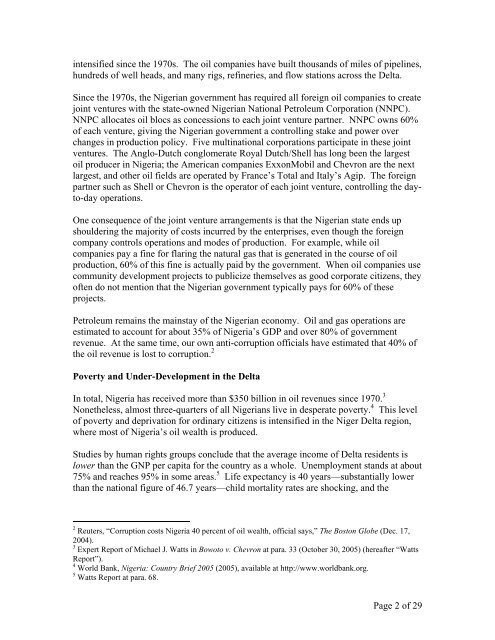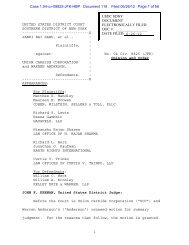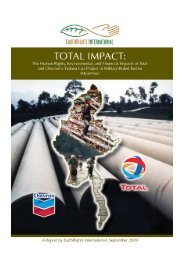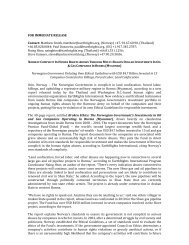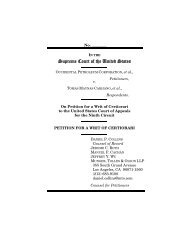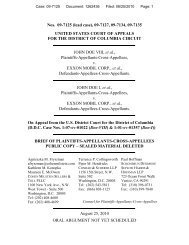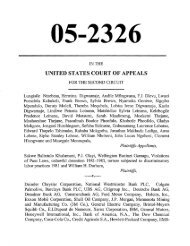The Oil Industry and Human Rights in the Niger Delta - EarthRights ...
The Oil Industry and Human Rights in the Niger Delta - EarthRights ...
The Oil Industry and Human Rights in the Niger Delta - EarthRights ...
Create successful ePaper yourself
Turn your PDF publications into a flip-book with our unique Google optimized e-Paper software.
<strong>in</strong>tensified s<strong>in</strong>ce <strong>the</strong> 1970s. <strong>The</strong> oil companies have built thous<strong>and</strong>s of miles of pipel<strong>in</strong>es,hundreds of well heads, <strong>and</strong> many rigs, ref<strong>in</strong>eries, <strong>and</strong> flow stations across <strong>the</strong> <strong>Delta</strong>.S<strong>in</strong>ce <strong>the</strong> 1970s, <strong>the</strong> <strong>Niger</strong>ian government has required all foreign oil companies to createjo<strong>in</strong>t ventures with <strong>the</strong> state-owned <strong>Niger</strong>ian National Petroleum Corporation (NNPC).NNPC allocates oil blocs as concessions to each jo<strong>in</strong>t venture partner. NNPC owns 60%of each venture, giv<strong>in</strong>g <strong>the</strong> <strong>Niger</strong>ian government a controll<strong>in</strong>g stake <strong>and</strong> power overchanges <strong>in</strong> production policy. Five mult<strong>in</strong>ational corporations participate <strong>in</strong> <strong>the</strong>se jo<strong>in</strong>tventures. <strong>The</strong> Anglo-Dutch conglomerate Royal Dutch/Shell has long been <strong>the</strong> largestoil producer <strong>in</strong> <strong>Niger</strong>ia; <strong>the</strong> American companies ExxonMobil <strong>and</strong> Chevron are <strong>the</strong> nextlargest, <strong>and</strong> o<strong>the</strong>r oil fields are operated by France’s Total <strong>and</strong> Italy’s Agip. <strong>The</strong> foreignpartner such as Shell or Chevron is <strong>the</strong> operator of each jo<strong>in</strong>t venture, controll<strong>in</strong>g <strong>the</strong> dayto-dayoperations.One consequence of <strong>the</strong> jo<strong>in</strong>t venture arrangements is that <strong>the</strong> <strong>Niger</strong>ian state ends upshoulder<strong>in</strong>g <strong>the</strong> majority of costs <strong>in</strong>curred by <strong>the</strong> enterprises, even though <strong>the</strong> foreigncompany controls operations <strong>and</strong> modes of production. For example, while oilcompanies pay a f<strong>in</strong>e for flar<strong>in</strong>g <strong>the</strong> natural gas that is generated <strong>in</strong> <strong>the</strong> course of oilproduction, 60% of this f<strong>in</strong>e is actually paid by <strong>the</strong> government. When oil companies usecommunity development projects to publicize <strong>the</strong>mselves as good corporate citizens, <strong>the</strong>yoften do not mention that <strong>the</strong> <strong>Niger</strong>ian government typically pays for 60% of <strong>the</strong>seprojects.Petroleum rema<strong>in</strong>s <strong>the</strong> ma<strong>in</strong>stay of <strong>the</strong> <strong>Niger</strong>ian economy. <strong>Oil</strong> <strong>and</strong> gas operations areestimated to account for about 35% of <strong>Niger</strong>ia’s GDP <strong>and</strong> over 80% of governmentrevenue. At <strong>the</strong> same time, our own anti-corruption officials have estimated that 40% of<strong>the</strong> oil revenue is lost to corruption. 2Poverty <strong>and</strong> Under-Development <strong>in</strong> <strong>the</strong> <strong>Delta</strong>In total, <strong>Niger</strong>ia has received more than $350 billion <strong>in</strong> oil revenues s<strong>in</strong>ce 1970. 3None<strong>the</strong>less, almost three-quarters of all <strong>Niger</strong>ians live <strong>in</strong> desperate poverty. 4 This levelof poverty <strong>and</strong> deprivation for ord<strong>in</strong>ary citizens is <strong>in</strong>tensified <strong>in</strong> <strong>the</strong> <strong>Niger</strong> <strong>Delta</strong> region,where most of <strong>Niger</strong>ia’s oil wealth is produced.Studies by human rights groups conclude that <strong>the</strong> average <strong>in</strong>come of <strong>Delta</strong> residents islower than <strong>the</strong> GNP per capita for <strong>the</strong> country as a whole. Unemployment st<strong>and</strong>s at about75% <strong>and</strong> reaches 95% <strong>in</strong> some areas. 5 Life expectancy is 40 years—substantially lowerthan <strong>the</strong> national figure of 46.7 years—child mortality rates are shock<strong>in</strong>g, <strong>and</strong> <strong>the</strong>2 Reuters, “Corruption costs <strong>Niger</strong>ia 40 percent of oil wealth, official says,” <strong>The</strong> Boston Globe (Dec. 17,2004).3 Expert Report of Michael J. Watts <strong>in</strong> Bowoto v. Chevron at para. 33 (October 30, 2005) (hereafter “WattsReport”).4 World Bank, <strong>Niger</strong>ia: Country Brief 2005 (2005), available at http://www.worldbank.org.5 Watts Report at para. 68.Page 2 of 29


